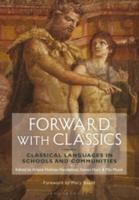
Bloomsbury (2018) p/b 276pp £29.99 (ISBN 9781474297677)
Prejudice alert: the reviewer helped to found the charity Friends of Classics (1991-2016) and is an adviser to Classics for All.
This wide-ranging collection of essays is aimed at all those with an interest in making classics in all its manifestations available to everyone from schoolchildren to adults (to that extent the title is slightly misleading: the subject matter does touch on history and culture as well as the languages).
After a general introduction about the politics of classical education (to which the reviewer will return), chapters cover the widening of access to classics in the UK; classics in Australia, Brazil and Europe; the revival in the USA of Rouse’s famous ‘direct method’ of teaching Latin (speaking and listening as well as reading and writing); getting Latin into primary schools, with details of the Norfolk project, and into secondary schools, with reference to the Brighton project; the Iris Project in Oxford and East End ‘Capital Classics’ Centre (supported with money from the London Schools Excellence fund); two case studies of starting classics from scratch in Tower Hamlets and Coventry; Latin in South African schools and prisons; taking classics into communities; non-linguistic studies; online classics in the OU; classics and skills for the 21st C (the reviewer was, inevitably, slightly surprised to see that the three McDonald surveys relevant to this subject [funded by Friends of Classics], especially the nationwide YouGov [2111] and Cobalt Sky [2015] surveys, were not consulted: google ‘The McDonald Classical Surveys’); ‘people’s classics’ in the 18th and 19th C; and finally an assessment of the achievements of the various classical initiatives so far. Supporters of Classics for All will be pleased to see the charity has played a major part in most of the UK developments in schools and dominates the references in the index to classics-supporting bodies.
Inevitably the essays, each backed (where relevant) with extensive reading lists, are people- and context-specific. What else could they be? It takes dedicated enthusiasts to turn round the fortunes of a subject, and they often have their own special take on things. Nevertheless, this collection of essays will be essential reading for anyone determined to open up the ancient world in schools or elsewhere: it contains an invaluable fund of practical ideas to advance the cause. Especially incisive is Dr Michael Scott’s superb account of how he actively engaged his own university (Warwick) in funding outreach classical programmes into schools on the ‘Impact’ agenda. O si sic omnes…
To return to the introduction. It was written by Steven Hunt, the classics lecturer in Cambridge University’s education department, who has gone far beyond the call of duty in pushing forward all the most important classical developments in schools in the UK over the past 18 years and is the driving force behind this important collection of essays. Inevitably, being in the thick of things, he writes as one fighting constant battles against government policy on the classics. This is, of course, of much interest, covers a great deal of ground and rightly sets the whole debate about classics in what is at times a rather depressing educational context. Readers who begin with it should be aware that the rest of the book is thoroughly upbeat and shows just what classicists, an endlessly imaginative and determined lot, can achieve, whatever hurdles government may put in the way.
Three small additional comments: Hunt feels that government policy has been driven by an unhelpful right-wing agenda (short-hand for ‘grammar’?). That may be true, but at least there has been a pro-classics agenda. Second, he is also concerned that the revisions to the GCSEs in Latin and Greek (for which your reviewer was responsible) will make the subjects more difficult and therefore less attractive. He is right to be concerned, but in fact an examination board review reported that the difficulty level appears to be unchanged. Finally, whatever one thinks of Gove, he has given classics an official status in primary as well as secondary schools and, to cap it all, included Latin and Greek in the EBacc along with ancient history. Who would have put money on that? Never has our educational profile been so high and so protected. We had better take advantage of it while it lasts. If a Corbyn-McDonnell government ever comes to power, quod omen di avertant, classics will be straight out of the window unless Dame Mary Beard, with her (presumably) left-wing classical agenda (shorthand for ‘no grammar’?), can gallop to the rescue.
All in all, then, a most heartening compilation, coming at exactly the right moment to take advantage of current government approval and to spur on more initiatives. The reviewer adds here a personal correction, for the record. I did not, as Hunt very kindly says, ‘set up’ Classics for All. Jeannie Cohen and I, as trustees of the ‘mother’ charity Friends of Classics (integrated into CfA in 2016), excogitated the idea in about 2007 and bounced it around others but got no further. Without the intervention of two highly experienced Friends, Sarah Jackson, chief executive of the charity ‘Working Families’ and Graham Shaw, an international banker, the charity would never have got off the ground, as it did in 2010.
Peter Jones
Peter Jones has made his views about the study of the ancient world in translation available for many years at:
https://classicsforall.org.uk/about/dr-peter-jones-classics/
Also see
https://classicsforall.org.uk/about/management-team-advisers/
